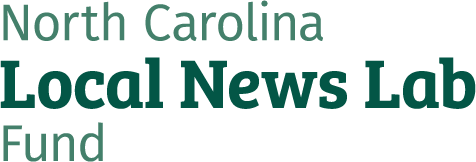NCCF announces more than $300,000 in grant awards to support local disaster recovery news and information
The North Carolina Community Foundation, in partnership with the North Carolina Local News Lab Fund, announces more than $300,000 in grant awards to support information and public engagement as communities recover from Hurricane Florence and prepare eastern North Carolina for a more resilient future.
Having trustworthy, accurate, and timely news and information is vital for North Carolina’s communities as they heal and rebuild. To meet this need, the NC Local News Lab Fund awarded more than $180,000 in grants to organizations and initiatives around news and information related to hurricane recovery in eastern North Carolina. The NCCF statewide grants committee matched the Local News Lab’s support with $150,000 from the NCCF Disaster Relief Fund.
Grants were awarded to:
Black River Health Services: Farmworker Disaster Resilience Plan who will train leaders in the Spanish-speaking farmworker community who can share critical information in times of disaster.
Core Sound Waterfowl Museum & Heritage Center who will assess the information needs of 13 unincorporated villages in preparation of storms to come.
Duke University who will host a workshop for journalists, meteorologists, public information officers, and leaders to close gaps between researchers and storm-vulnerable communities.
EducationNC who will produce a series of multimedia stories about Florence-impacted communities, while also working to assess their information needs and build partnerships.
Enlace Latino who will fill a gap in Spanish-language information about safety, health, housing, and economic aid related to disaster recovery.
ISeeChange who will aggregate and visualize anecdotal data about climate to inform the locations of five new flood monitoring sensors.
Lenoir Community College Foundation who will hire locally trained professionals for a broadcast collaboration between the Jones County Community College and local county leadership.
The News & Observer who will produce reporting on hurricane recovery accountability, including reporting on efforts to rebuild and revitalize communities.
North Carolina Farmworkers Project who will distribute a disaster relief toolkit for farmworker serving organizations, compile learnings, and create tools to share disaster-related information.
North Carolina Health News who will report stories on health in the wake of disaster recovery, partnering with organizations to train young people to use audio equipment for this reporting.
RAFI - USA who will increase farmer access to information on disaster recovery resources and assistance with input from Lumbee, African-American, and military veteran farmers.
Support the Port who will host a series of health and wellness events to support the Wilmington African-American community’s continued recovery and future emergency preparedness.
UNC Center for Public Television who will develop a series of short-form, multiplatform videos on storm preparedness and produce short-form field reports after storms.
Working Narratives: Flood Zone who will produce a podcast and hold roughly a dozen events in New Hanover County, Columbus County, Pender County, and Brunswick County.
This round of funding speaks to the partnership NCCF has developed with the NC Local News Lab Fund. According to Leslie Ann Jackson, NCCF vice president of community investment and engagement, “We’re proud of the partnership we’ve forged with the NC Local News Lab and the willingness our partners have shown to address the persistent needs for access to information and for continued media coverage of disaster recovery. These grants are a tremendous asset to the communities in our state still recovering from Hurricane Florence and building resilience.”
"We're excited to see funders and organizations coming together to support the vital information needs of eastern North Carolina's communities around disaster resilience. We know that information needs persist long after a disaster strikes, and these resources paired with NCCF’s matching support will better prepare communities for the next hurricane. Together, we’re able to do far more than we would separately, ” Teresa Gorman, NC Local News Lab Fund Advisory Board Member said.
The NC Local News Lab Fund was established at NCCF in 2017 by a group of local and national funders who believe in the power of local journalism, local stories and local people to strengthen our democracy. Financial support from Democracy Fund, the Prentice Foundation, and Park Foundation powers an ecosystem strategy that combines grantmaking with programming designed to build sustainable revenue models and connections.
The Fund has invested nearly $700,000 in North Carolina organizations in two rounds of grants. Grantee organizations are currently serving communities recovering from hurricanes, youth learning about the power of their voices, and building collaborative partnerships that inform North Carolinians and share resources. The Fund works to ensure that all North Carolinians have access to the local news and information they need to make their communities thrive.
—
About North Carolina Local News Lab Fund
The North Carolina Local News Lab Fund is a pooled fund at the North Carolina Community Foundation dedicated to building a more resilient, sustainable, and inclusive news and information ecosystem in North Carolina. Through grantmaking, boosting collaboration, and amplifying lessons and success stories, the Fund works to ensure that everyone in North Carolina can find, trust, and use high-quality news and information, delivered by providers that are reflective of and engaged with their communities. Since launching in 2017, the Fund has invested more than $2.4 million in dozens of local organizations that are telling vital, underreported stories and filling gaps where information otherwise isn’t being spread. Learn more at nclocalnews.org.
